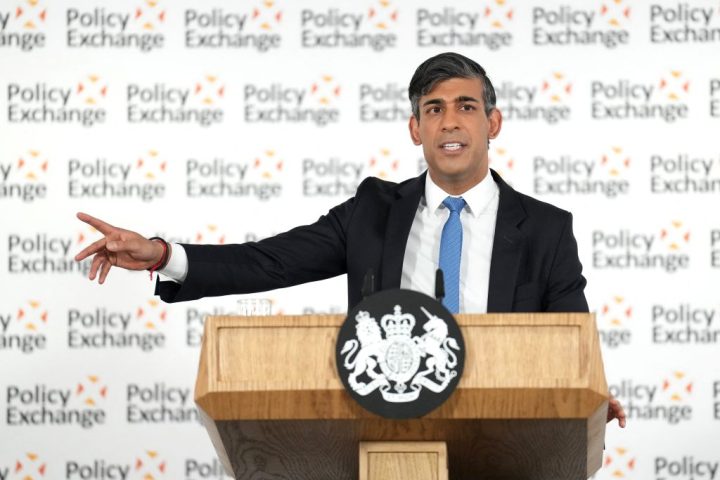Rishi Sunak has this morning given a speech aimed at framing the choice at the next election: security with the Tories or risk with Labour. The Prime Minister’s 30-minute address at the Policy Exchange think tank in London was centred on the idea that ‘the next few years will be some of the most dangerous yet most transformational our country has ever known’. The right choice of leader for the country, he implied, is the person who can be trusted most to shepherd the UK through a period of change ranging from foreign threats to artificial intelligence to cultural challenges. Unsurprisingly, Sunak argued that the right leader to handle the fact that ‘more will change in the next five years than in the last 30’ is, in fact, himself.
Of the global challenges, Sunak said: ‘The dangers that threaten our country are real. There’s an increasing number of authoritarian states like Russia, Iran, North Korea and China working together to undermine us and our values. War has returned to Europe, with our Nato allies warning that if Putin succeeds in Ukraine, they might be next.’ However, he then moved on to how the change also related to cultural issues within UK society when it comes to an assault on liberal values: ‘From gender activists hijacking children’s sex education, to cancel culture, vocal and aggressive fringe groups are trying to impose their views on the rest of us’.
Sunak’s biggest problem is the public – and whether anyone is listening
When it came to Keir Starmer, Sunak used the address to make light of his party’s most recent defector – Natalie Elphicke, who crossed the floor to Labour last week. With a growing backlash over the right-wing politician’s move and questions over her prior support for her former husband who was convicted of sexual assault, Sunak joked that Starmer had gone from ’embracing Jeremy Corbyn to Natalie Elphicke in the cynical pursuit of power at any price’. It shows how the Tories plan to centre on Starmer’s character in the election campaign. Sunak also said he would debate Starmer as many times as he liked – amid worries that Labour may try to dodge many head to heads. In the Q and A that followed, Sunak argued that the country would be less safe under Starmer as he has not committed to raising defence spending to 2.5 per cent and Starmer had campaigned to make Corbyn prime minister not once but twice.
As well as striking a cautious tone by suggesting there is a danger to changing government, Sunak attempted to hit a more positive note at times. Taking inspiration from his predecessor Boris Johnson, he said that he was not a doomster and argued his party was the future on the grounds that Labour has so far offered little in the way of substantial solutions. He cited the small boat crossings as evidence of this – with Starmer recently saying he would axe the Tories’s Rwanda scheme.
So will this speech move the dial? Sunak and his team have been planning this address for some time – and had previously considered giving it last week. They wanted to time it with the Tories entering power in 2010 as an anniversary moment. It’s why Sunak repeatedly tried to defend the record of the Tories’ time in power, arguing it would be wrong to focus on some of the lower points such as how Liz Truss’s premiership ended. As expected, Labour have been quick to dismiss Sunak’s comments, with Jonathan Ashworth calling it another doomed reset.
But Sunak’s biggest problem is the public – and whether anyone is listening. The fear among Tory MPs is that most voters have stopped doing so, no matter what they now do or say. However, even if this is the case, the speech today is still instructive of how the Tories plan to fight the election and stave off losses. If the election takes place in the Autumn, campaigning will overlap with Donald Trump’s tilt for the White House. As a result, security will likely be a big factor. The bet Labour is making is that financial security will come first – and that the sense that voters are worse off than they were at the last election can be used to argue for change. The Tories will try to test this by pushing the idea that, in an era of turmoil, it is best to stick to what you know.
Catch up on Coffee House Shots with Katy Balls, Fraser Nelson and Natasha Feroze:








Comments